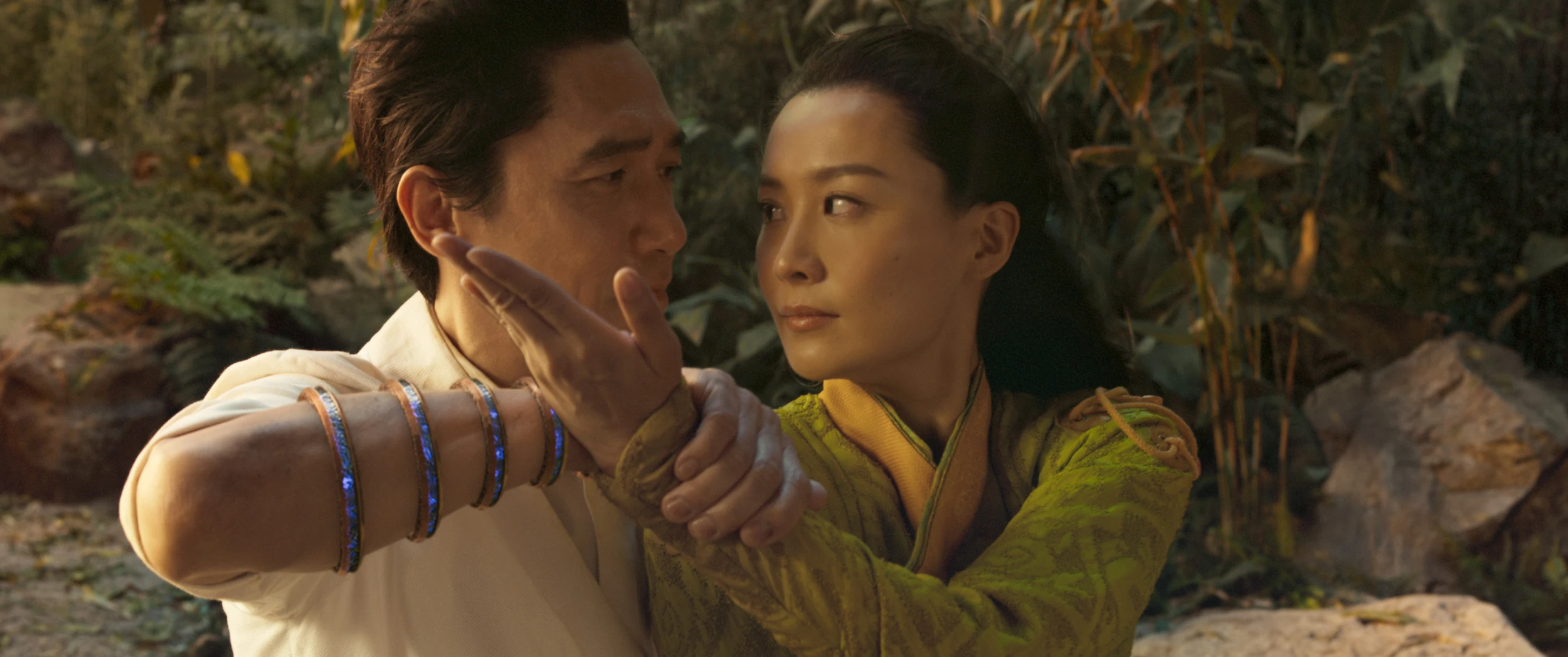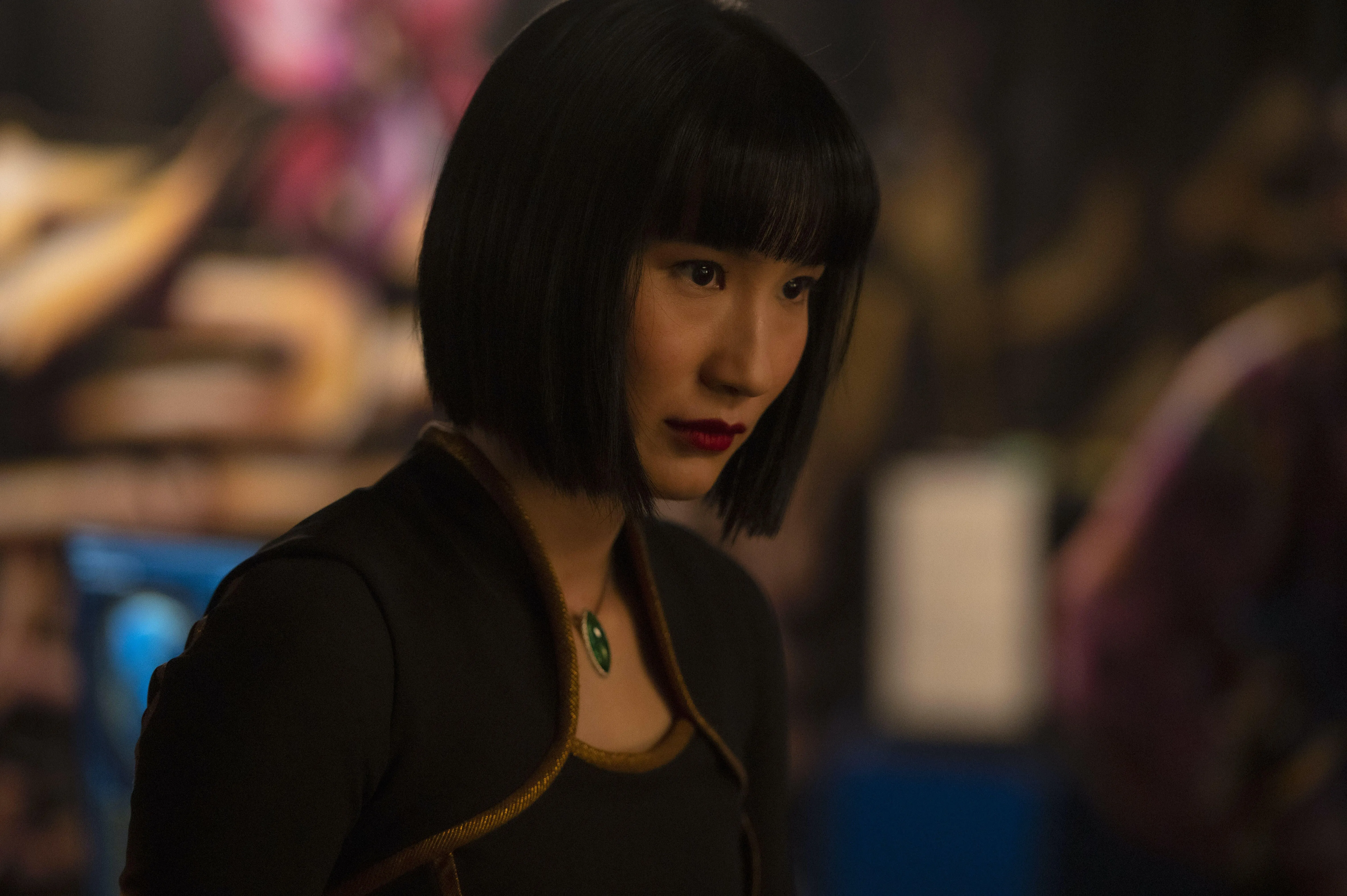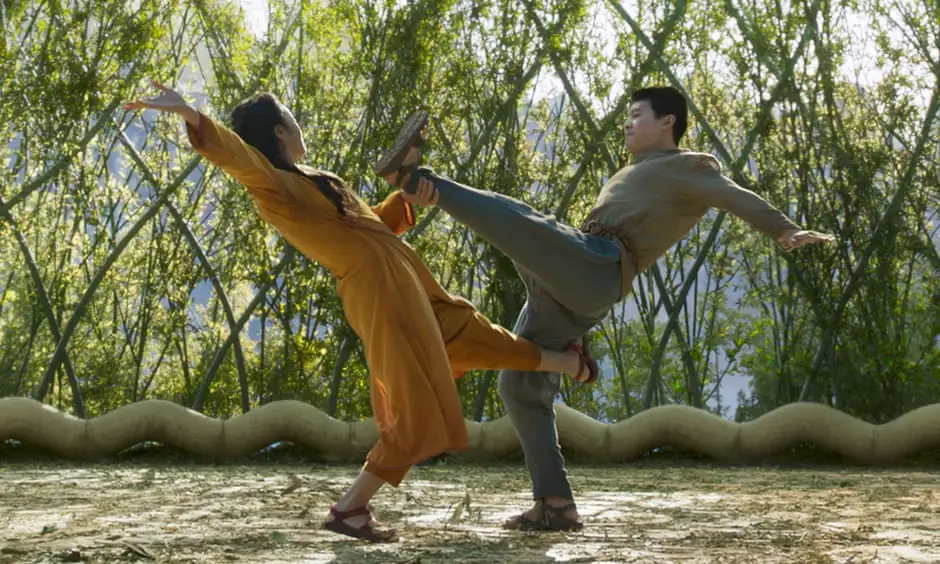Shang-Chi and the Legend of the Ten Rings
- 6 minutes read - 1131 words
- Format:
- Film
- Date Seen:
- 2021-09-05T12:56:35Z
- Venue:
- AMC Lincoln Center - Dolby
- Stars:
- ★★★★
I had a great time with this movie. I walked in with no expectations and walked out with a giant smile on my face. While not as fun as “Suicide Squad” (that kind of mayhem is hard to top), it breathes an exciting new energy into the shadow of Phase I/II MCU and suggests that the MCU’s best days are in no way guaranteed as having already happened.
As (yet another) superhero origin story, SCLTT largely avoids following the “I was just a normal kid…coming into powers…conflict…and now there’s a new hero” formula. There’s a narrative thread hint of it, but then we’re given an amazing fight on a Muni bus along California Street, through the Chinatown tunnel, and then (movie magic, folks) Ghiradelli Square. And with that, we, and “Shaun’s” friend “Katy” learn that the mild-mannered valet at the Fairmont has actually been a kung-fu master named “Shang-Chi” all along. With the genie uncorked, we begin Shang-Chi’s mission to find his sister (played by Meng’er Zhang), find his dad (Tony Leung!), meet his auntie (Michelle Yeoh!) and save the world.
I think part of what makes so much of this movie work is that it effortlessly blends a superhero movie and a Chinese historical romance soap opera together. In one time line, we have the story of Shang-Chi’s father, a conqueror enabled by the mystical 10 rings, pillaging city after city until he meets Li (Fala Chen). Used to power and force being the key trademarks of his consquest, Li’s kung fu undoes him with harmony and beauty. It teaches that the closed-fist strike is not the only way for a man to face the world. Their kung fu battle is a gorgeous ballet, a conversation about power and strength, and no words are spoken. For every strike of power he gives, she beguiles, smiles, and redirects. When his power is unleashed, she lets the Earth humble him. And when his ego rampages like a charging bull, she lets the bull end up face-down, in a pond.

Romance in kung-fu
It’s truly, truly remarkable. It’s the kind of dialogue that you could hear in outstanding dance numbers like Cyd Charisse + Gene Kelley. That this humbled, immortal warlord is falling in love, and is the antagonist, and we feel for him is a step forward from the character development normally seen in the genre and is a huge credit to the subtle facial acting of Tony Leung.
Li leads her eventual husband, the quelled warlord Xu, to renounce his ways of conquest and settle to the simple life of family with her. His old life comes back to haunt him tragically and, in profound grief, he resumes his ways of closed-fist conquest in a modern time. Tony Leung continues a nuanced portrayal as he reveals, without preaching, that even a conqueror when touched by love cannot be the same man anymore — even as he undertakes merciless deeds in pursuit of that lost equanimity. Frankly, Leung and Chen are so good together, that could have been a movie.
But the true tragedy of tragedy is that it spreads. After Xu hardens his heart, it pulls young Shang-Chi and his sister, Xialing, into the umbra of his world of dominance-based masculinity. For Shang-Chi, this manifests as the brutal tortures of toning his body to be come a weapon; for Xialing, it’s drifting alone in an isolated world of neglect. Rejecting their father, the two moved apart independently: Xialing set up a fight club in Macao and Shang-Chi, er, “Shaun” decamped to live a Clark Kent life in San Francisco.
Putting the Kids Back Together
The scenes where Shang-Chi goes to find his sister felt very “Black Panther in Seoul gambling den” complete with an aerial, multi-level fight sequence. Drawing heavily from the tradition of Jackie Chan movies, the moment you see our heroes walk under bamboo scaffolding around the gaming den, you know there will be bending bamboo fight sequences…and there are. And they are great. The action choreography is tight and crisp, focused, and given room to breathe. The cuts aren’t ridiculously fast and are fully enjoyable.

Bad bitch bob in effect
Shang-Chi catches up with his sister, all-grown-up Xialing, and she gives him a solid drubbing for abandoning her and breaking her heart. With her bad bitch bob (hat tip to “The Mary Sue” for that one) and athletic prowess, Meng’Er Zhang is a joy to watch. Her scenes with dart-on-rope (shengbiao) weapons are phenomenal.
Putting the Family Back Together
Eventually Shang-Chi, Xialing, and Katy all find themselves discovering Xu’s motivation for finding them: he’s found a means whereby he can restore the family. The conqueror remains grief-riddled but hopeful that he can re-assemble the family he and his beloved Li created. This will require him to wage a final war on the village of Ta Lo, home of his late wife. For plot reasons, the kids escape Xu’s compound and run for refuge in the hidden, transdimensional vilaage of Ta Lo, the only place Xu has never been able to march on.
Upon arriving, the trio (along with an actor and a Fantastic Beast) discover that the village is run, in the language of the script, by a “kung fu goddess,” Ying Nan, Li’s sister, played by none other than the incomparable Michelle Yeoh. And here’s where the two movies re-join yet again, it’s now Shang-Chi’s chance to dance in the “Crouching Tiger” subplot to the movie. If Xu’s battle with Lu was about power, Shang-Chi’s battle is about family and his identity in it.

Three decades of schooling fools
The dialogue I heard went like this. His kung fu asks “Was father right?” And auntie answers maddeningly, “In his way.” He asks “Was mother right?” The answer is still maddening: “In her way.” He asks “Is strength right.” But she replies, “Yes, but it is not entire.” Honestly, Yeoh’s beautiful and wise face and her radiance of pure love through the fight pulled a tear or two from your humble narrator. It is gorgeous and its intentional echoes of the Xu/Li fight demonstrated why martial art has “art” in its name.
The Final Act
After a night’s rest in the village beyond realms, we’re back in typical Marvel stakes: Joseph Campbell walk through the underworld; A sacrifice; A supernatural threat; Sacrifice; Rebirth; A pitched battle; Things blowing up. What I will say here is that the addition of Chinese mythological creatures (Chinese lions, etc.) are beautiful onscreen and their Taoist context and natural harmony make for stellar visuals. While it’s certainly a Marvel like ending, it so thoroughly winds Chinese myth into the visual aspect that it’s also a Chinese movie as well. It’s a real achievement in the continued growth of and within the Marvel juggernaut.